25 acclaimed writers select the 25 most influential books
Gabriel García Márquez’s seminal novel One Hundred Years of Solitude topped the list of books that have most shaped world literature over the last twenty-five years, according to a survey of international writers specially commissioned by Wasafiri as part of its twenty-fifth anniversary in 2009. The 25 books were chosen by 25 respected names in international writing, many of whom have contributed over the years to Wasafiri magazine, including Indra Sinha, Blake Morrison and Fred D’Aguiar. The list of prize-winning fiction, poetry and ground-breaking non-fiction includes Satanic Verses by Salman Rushdie; Dreams from My Father by Barack Obama; Birthday Letters by Ted Hughes; Nabokov’s Lolita and JM Coetzee’s Disgrace. Gabriel García Márquez’s One Hundred Years of Solitude was the only book to have been picked by more than one writer, demonstrating the huge breadth of writing covered within world literature. Susheila Nasta comments: ‘Writers have always moved worlds with words, transporting us beyond the known and familiar. The eclecticism of this selection showcases the true diversity which is international contemporary writing today. 25 years ago ‘international writing’ was considered off-centre. This selection shows how much the landscape has changed, with many of these titles now part of our literary canon’. Aminatta Forna: The Famished Road by Ben Okri Amit Chaudhuri: Collected Poems by Elizabeth Bishop Bernardine Evaristo: Staying Power: The History of Black People in Britain by Peter Frye Beverley Naidoo: Roll of Thunder, Hear My Cry by Mildred D Taylor Brian Chikwava: The Savage Detectives by Roberto Bolaño Blake Morrison: The Stories of Raymond Carver by Raymond Carver Chika Unigwe: One Hundred Years of Solitude by Gabriel García Márquez Daljit Nagra: North by Seamus Heaney David Dabydeen: A House for Mr Biswas by V S Naipaul Elaine Feinstein: Birthday Letters by Ted Hughes Fred D'Aguiar: Palace of the Peacock by Wilson Harris Hirsh Sawhney: River of Fire by Quarratulain Hyder Indra Sinha: Lolita by Vladimir Nabokov John Haynes: Philosophical Investigations by Ludwig Wittgenstein Lesley Lokko: Midnight's Children by Salman Rushdie Maggie Gee: Disgrace by J M Coetzee Marina Warner: Dreams from My Father by Barak Obama Maya Jaggi: The English Patient by Michael Ondaatje Michael Horovitz: Collected Poems by Allen Ginsberg Minoli Salgado: Anil's Ghost by Michael Ondaatje Nii Parkes: One Hundred Years of Solitude by Gabriel García Márquez Roger Robinson: Sula by Toni Morrison Sujata Bhatt: One Hundred Years of Solitude by Gabriel García Márquez Sukhdev Sandhu: The Private Life of Chairman Mao by Dr Li Zhisui Tabish Khair: The Satanic Verses by Salman Rushdie -- 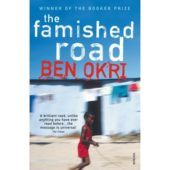 Aminatta Forna: The Famished Road by Ben Okri I think Ben Okri's The Famished Road did for a literature concerned with Africa what Rushdie's Midnight's Children did for literature of and about India. I think both books brought a new interest, audience and understanding to literature that was not of the West. Both authors were based in the UK and were published by UK publishers, they open the floodgates for writers based both here and on Asian and African continents who offered a new way of seeing. Amit Chaudhuri: Collected Poems by Elizabeth Bishop Elizabeth Bishop's Collected Poems, which I first chanced upon in Bombay in the late seventies in a library, has had an enormous, if subtle, impact on how we think of poetry and language today. It's a reminder that travel, exile, cosmopolitan irony, as well as a certain narrative of the self can be addressed just as well - if not better - through the means poetry has at hand (economy, form, the image, and a kind of grace) as they can by the novel or the essay. Poetry experiences and communicates the undercurrent of our lives incomparably; there's hardly a better argument for this simple fact than Bishop's book. My only regret is that her voice is not heard more clearly in the country in which I first discovered her.
Aminatta Forna: The Famished Road by Ben Okri I think Ben Okri's The Famished Road did for a literature concerned with Africa what Rushdie's Midnight's Children did for literature of and about India. I think both books brought a new interest, audience and understanding to literature that was not of the West. Both authors were based in the UK and were published by UK publishers, they open the floodgates for writers based both here and on Asian and African continents who offered a new way of seeing. Amit Chaudhuri: Collected Poems by Elizabeth Bishop Elizabeth Bishop's Collected Poems, which I first chanced upon in Bombay in the late seventies in a library, has had an enormous, if subtle, impact on how we think of poetry and language today. It's a reminder that travel, exile, cosmopolitan irony, as well as a certain narrative of the self can be addressed just as well - if not better - through the means poetry has at hand (economy, form, the image, and a kind of grace) as they can by the novel or the essay. Poetry experiences and communicates the undercurrent of our lives incomparably; there's hardly a better argument for this simple fact than Bishop's book. My only regret is that her voice is not heard more clearly in the country in which I first discovered her. 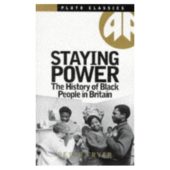 Bernardine Evaristo: Staying Power: The History of Black People in Britain by Peter Fryer This remains the definitive guide to Britain’s black history. It told the world that black and Asian roots went deep into British history because our presence on these shores spanned nearly 2000 years. For a country steeped in the myth of its own racial purity, this was a bit of a culture shock. A History of Blacks in Britain by Edward Scobie was the first book of this kind, but its scope was less ambitious (Johnson Publishing, 1972). It was ‘Staying Power, both scholarly and accessible, that expanded our understanding of what it means to be British.
Bernardine Evaristo: Staying Power: The History of Black People in Britain by Peter Fryer This remains the definitive guide to Britain’s black history. It told the world that black and Asian roots went deep into British history because our presence on these shores spanned nearly 2000 years. For a country steeped in the myth of its own racial purity, this was a bit of a culture shock. A History of Blacks in Britain by Edward Scobie was the first book of this kind, but its scope was less ambitious (Johnson Publishing, 1972). It was ‘Staying Power, both scholarly and accessible, that expanded our understanding of what it means to be British. 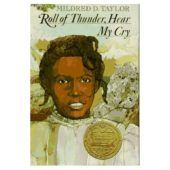 Beverley Naidoo: Roll of Thunder, Hear My Cry by Mildred D Taylor Roll of Thunder, Hear My Cry, winner of the 1977 Newberry Medal, by Mildred D Taylor. For three decades, this novel has made 1930s African-American lives in Mississippi vividly present in secondary school literature classes throughout the UK. Drawing on family stories she had heard since childhood, Mildred D Taylor created feisty young Cassie Logan and her family who pit humanity and survival humour against the crude brutality and stupidity of racist power. Roll of Thunder opened a door to a world previously suppressed and ignored. Taylor continued to develop an award-winning saga of books about the Logan family, and a wonderful prequel The Land– about Cassie Logan’s grandfather - won the Los Angeles Times Book Prize in 2001.
Beverley Naidoo: Roll of Thunder, Hear My Cry by Mildred D Taylor Roll of Thunder, Hear My Cry, winner of the 1977 Newberry Medal, by Mildred D Taylor. For three decades, this novel has made 1930s African-American lives in Mississippi vividly present in secondary school literature classes throughout the UK. Drawing on family stories she had heard since childhood, Mildred D Taylor created feisty young Cassie Logan and her family who pit humanity and survival humour against the crude brutality and stupidity of racist power. Roll of Thunder opened a door to a world previously suppressed and ignored. Taylor continued to develop an award-winning saga of books about the Logan family, and a wonderful prequel The Land– about Cassie Logan’s grandfather - won the Los Angeles Times Book Prize in 2001. 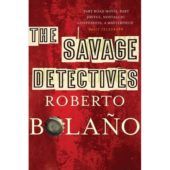 Brian Chikwava: The Savage Detectives by Roberto Bolaño I've earmarked Roberto Bolaño's The Savage Detectives, which I think is a stunning novel in the scope and depth of its subjects, and probably the only novel in recent years that convincingly unfolds on four continents. With a candid realist style that casually swashes utopian dreams against the cold hard edges of the late twentieth century capitalism this is a piece of work that is disarmingly colloquial and virtuoso in its rather unliterary flounce.
Brian Chikwava: The Savage Detectives by Roberto Bolaño I've earmarked Roberto Bolaño's The Savage Detectives, which I think is a stunning novel in the scope and depth of its subjects, and probably the only novel in recent years that convincingly unfolds on four continents. With a candid realist style that casually swashes utopian dreams against the cold hard edges of the late twentieth century capitalism this is a piece of work that is disarmingly colloquial and virtuoso in its rather unliterary flounce. 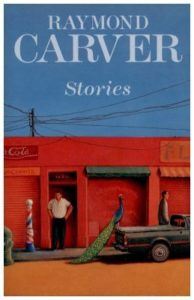 Blake Morrison: The Stories of Raymond Carver by Raymond Carver For better or worse, the most influential book of the past 25 years is the paperback edition of The Stories of Raymond Carver, published in 1985, which gathered his first three collections into a single volume. No creative writing course would be complete without it: thousands of young writers have been taught to pare their work to the bone, just as Carver was by his editor Gordon Lish - though nobody can match Carver's genius for rhythm and nuance.
Blake Morrison: The Stories of Raymond Carver by Raymond Carver For better or worse, the most influential book of the past 25 years is the paperback edition of The Stories of Raymond Carver, published in 1985, which gathered his first three collections into a single volume. No creative writing course would be complete without it: thousands of young writers have been taught to pare their work to the bone, just as Carver was by his editor Gordon Lish - though nobody can match Carver's genius for rhythm and nuance. 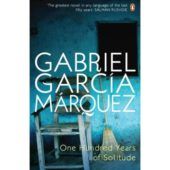 Chika Unigwe: One Hundred Years of Solitude by Gabriel García Márquez It will have to be One Hundred Years of Solitude. Márquez completely redefines how one looks at reality. Its language is powerful; the manner in which it crosses genres is revealing and I cannot think of a single writer-friend I know who has not been influenced by Márquez.
Chika Unigwe: One Hundred Years of Solitude by Gabriel García Márquez It will have to be One Hundred Years of Solitude. Márquez completely redefines how one looks at reality. Its language is powerful; the manner in which it crosses genres is revealing and I cannot think of a single writer-friend I know who has not been influenced by Márquez. 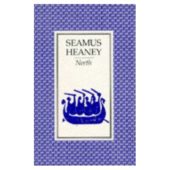 Daljit Nagra: North by Seamus Heaney Seamus Heaney’s North, for its intensely lyrical and idiosyncratic focus on aesthetic resolutions to conflict.
Daljit Nagra: North by Seamus Heaney Seamus Heaney’s North, for its intensely lyrical and idiosyncratic focus on aesthetic resolutions to conflict. 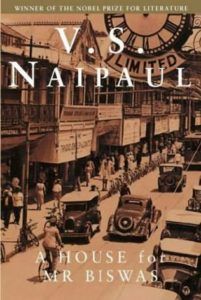 David Dabydeen: A House for Mr Biswas by V.S. Naipaul V.S. Naipaul’s A House for Mr Biswas placed the Indo-Caribbean person at the heart of world literature. Up to then, the Caribbean was perceived as being part of Africa and significant minorities like Indians were almost completely ignored in accounts of Caribbean culture.
David Dabydeen: A House for Mr Biswas by V.S. Naipaul V.S. Naipaul’s A House for Mr Biswas placed the Indo-Caribbean person at the heart of world literature. Up to then, the Caribbean was perceived as being part of Africa and significant minorities like Indians were almost completely ignored in accounts of Caribbean culture. 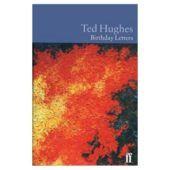 Elaine Feinstein: Birthday Letters by Ted Hughes One of the most influential books of poems in the last 25 years was Ted Hughes Birthday Letters. Not only did it bring his relationship with Sylvia Plath to vivid life, the book created a new form of intimate poetry, quite different from Robert Lowell’s confessional verse. On another tack, Richard Dawkins The Blind Watchmaker - a book, written before became so polemical - introduced a whole generation to Darwin.
Elaine Feinstein: Birthday Letters by Ted Hughes One of the most influential books of poems in the last 25 years was Ted Hughes Birthday Letters. Not only did it bring his relationship with Sylvia Plath to vivid life, the book created a new form of intimate poetry, quite different from Robert Lowell’s confessional verse. On another tack, Richard Dawkins The Blind Watchmaker - a book, written before became so polemical - introduced a whole generation to Darwin. 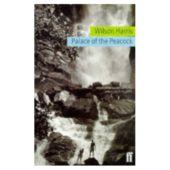 Fred D’Aguiar: Palace of the Peacock by Wilson Harris I've re-read, dipped into for a quote and passed on countless copies to friends and students, Palace of the Peacock (Faber) By Wilson Harris. This brief and brave novel celebrates its 50th year of publication in 2010 and it deserves the graces of every pair of literate eyes from Land’s End to John O’Groats for its poetic limpidity, narrative invention, and eco-wisdom.
Fred D’Aguiar: Palace of the Peacock by Wilson Harris I've re-read, dipped into for a quote and passed on countless copies to friends and students, Palace of the Peacock (Faber) By Wilson Harris. This brief and brave novel celebrates its 50th year of publication in 2010 and it deserves the graces of every pair of literate eyes from Land’s End to John O’Groats for its poetic limpidity, narrative invention, and eco-wisdom.  Hirsh Sawhney: River of Fire by Quarratulain Hyder My first reading of Quarratulain Hyder's River of Fire completely blew me away. Published in English during the 1990s, the book was originally printed in Urdu in 1959. Despite being released forty years ago, it nonetheless enchanted my MTV generation sensibilities. Here was a woman who wrote about migration without romanticizing it. She conjured up artistic aspiration and liberal ideals and then mocked them both. Most importantly, her sweeping version of the Indian subcontinent's history was erudite and radical and could only displease the powers that be. In times like ours, when stories about South Asia, Islam and women are clouded by a barrage of simplistic media images, readers can be educated and entertained by this iconic, edgy masterpiece.
Hirsh Sawhney: River of Fire by Quarratulain Hyder My first reading of Quarratulain Hyder's River of Fire completely blew me away. Published in English during the 1990s, the book was originally printed in Urdu in 1959. Despite being released forty years ago, it nonetheless enchanted my MTV generation sensibilities. Here was a woman who wrote about migration without romanticizing it. She conjured up artistic aspiration and liberal ideals and then mocked them both. Most importantly, her sweeping version of the Indian subcontinent's history was erudite and radical and could only displease the powers that be. In times like ours, when stories about South Asia, Islam and women are clouded by a barrage of simplistic media images, readers can be educated and entertained by this iconic, edgy masterpiece. 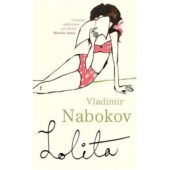 Indra Sinha: Lolita by Vladimir Nabokov One has to consider Midnight's Children (1984), as its success opened doors for so many new writers. But I will choose Lolita (1955) for Nabokov's astonishing virtuoso performance, which has never been excelled.
Indra Sinha: Lolita by Vladimir Nabokov One has to consider Midnight's Children (1984), as its success opened doors for so many new writers. But I will choose Lolita (1955) for Nabokov's astonishing virtuoso performance, which has never been excelled. 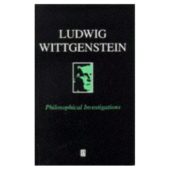 John Haynes: Philosophical Investigations by Ludwig Wittgenstein Philosophical Investigations shows the relationships between poetry and philosophy, lies behind/comes before the (in my view mainly derivative sometimes narcissistic) ideas of post-modernism, post-structuralism, post Marxism.
John Haynes: Philosophical Investigations by Ludwig Wittgenstein Philosophical Investigations shows the relationships between poetry and philosophy, lies behind/comes before the (in my view mainly derivative sometimes narcissistic) ideas of post-modernism, post-structuralism, post Marxism. 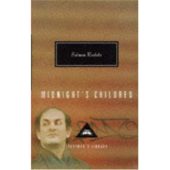 Lesley Lokko: Midnight’s Children by Salman Rushdie It would have to be Midnight’s Children – it opened up an enormous window into the post-colonial experience that has continued to shape, mould and influence English language fiction ever since.
Lesley Lokko: Midnight’s Children by Salman Rushdie It would have to be Midnight’s Children – it opened up an enormous window into the post-colonial experience that has continued to shape, mould and influence English language fiction ever since. 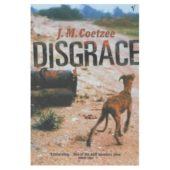 Maggie Gee: Disgrace by JM Coetzee This lean, cool, brilliant book cuts to the heart of South Africa’s past and future and of relations between colonist and colonised everywhere. JM Coetzee’s central character, David Lurie, begins as a touchy ageing academic who abuses his position by a relationship with a mixed-race undergraduate: the narrative slowly strips everything away from him. In Coetzee’s depressive but commanding vision, the only redemption for white people in the Eastern Cape is to yield power utterly, to become as powerless as the colonised once were and do the worse-than-menial jobs which were once done for them. Their reward, if they are lucky? Survival at subsistence level - the same reward they once offered to the indigenous peoples of South Africa. Morally relentless, pared to the bone, showing the rape of Lurie’s daughter by black intruders as a political and genetic weapon in a wider war, this great book presses inexorably towards its ending, but then there is a kind of surprise. As David Lurie, like King Lear, learns from his daughter to manage with nothing, he earns the compassion that Coetzee finally affords to all of us dying animals, human and non-human.
Maggie Gee: Disgrace by JM Coetzee This lean, cool, brilliant book cuts to the heart of South Africa’s past and future and of relations between colonist and colonised everywhere. JM Coetzee’s central character, David Lurie, begins as a touchy ageing academic who abuses his position by a relationship with a mixed-race undergraduate: the narrative slowly strips everything away from him. In Coetzee’s depressive but commanding vision, the only redemption for white people in the Eastern Cape is to yield power utterly, to become as powerless as the colonised once were and do the worse-than-menial jobs which were once done for them. Their reward, if they are lucky? Survival at subsistence level - the same reward they once offered to the indigenous peoples of South Africa. Morally relentless, pared to the bone, showing the rape of Lurie’s daughter by black intruders as a political and genetic weapon in a wider war, this great book presses inexorably towards its ending, but then there is a kind of surprise. As David Lurie, like King Lear, learns from his daughter to manage with nothing, he earns the compassion that Coetzee finally affords to all of us dying animals, human and non-human. 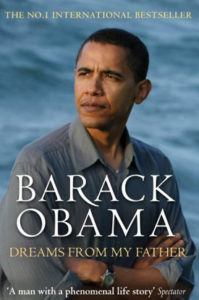 Marina Warner: Dreams from My Father by Barack Obama Obama's Dreams from My Father is definitely the most influential book historically, but it is also a work of literature too, beautifully written, and the product of deep, open-hearted reflection. But I'll also propose that the kinds of stories gathered from the witnesses at the Truth and Reconciliation Commission in South Africa, as collected, re-told and shaped by the Afrikaans poet Aintje Krog in her book Country of My Skull have had a huge impact on literature's sense of its own mission. Her appointment as official rapporteur was an act of exceptionally inspired patronage, because personal testimony to atrocity has come to inspire every branch of writing, from fiction to memoir.
Marina Warner: Dreams from My Father by Barack Obama Obama's Dreams from My Father is definitely the most influential book historically, but it is also a work of literature too, beautifully written, and the product of deep, open-hearted reflection. But I'll also propose that the kinds of stories gathered from the witnesses at the Truth and Reconciliation Commission in South Africa, as collected, re-told and shaped by the Afrikaans poet Aintje Krog in her book Country of My Skull have had a huge impact on literature's sense of its own mission. Her appointment as official rapporteur was an act of exceptionally inspired patronage, because personal testimony to atrocity has come to inspire every branch of writing, from fiction to memoir. 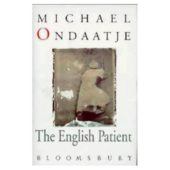 Maya Jaggi: The English Patient by Michael Ondaatje Novels such as Chinua Achebe’s Things Fall Apart (1958), Gunter Grass’s The Tin Drum (1959), Jean Rhys’s Wide Sargasso Sea (1966), Gabriel Garcia Marquez’s One Hundred Years of Solitude (1967), Salman Rushdie’s Midnight’s Children (1981), Toni Morrison’s Beloved (1987) and WG Sebald’s The Emigrants (1993) have all forged paths for others in their vision of the individual’s vexed relationship to history and language. Michael Ondaatje’s The English Patient (1992), assailing gaps left by mountains of second world war fiction and film, not only created an influential model for a new anti-war war novel, but remapped the post-war world through four characters in a Tuscan villa. While Anthony Minghella’s now classic, Oscar-winning film adaptation became skewed towards epic desert romance, the novel registers tectonic shifts in global history through the luminous intimacy of a chamber piece.
Maya Jaggi: The English Patient by Michael Ondaatje Novels such as Chinua Achebe’s Things Fall Apart (1958), Gunter Grass’s The Tin Drum (1959), Jean Rhys’s Wide Sargasso Sea (1966), Gabriel Garcia Marquez’s One Hundred Years of Solitude (1967), Salman Rushdie’s Midnight’s Children (1981), Toni Morrison’s Beloved (1987) and WG Sebald’s The Emigrants (1993) have all forged paths for others in their vision of the individual’s vexed relationship to history and language. Michael Ondaatje’s The English Patient (1992), assailing gaps left by mountains of second world war fiction and film, not only created an influential model for a new anti-war war novel, but remapped the post-war world through four characters in a Tuscan villa. While Anthony Minghella’s now classic, Oscar-winning film adaptation became skewed towards epic desert romance, the novel registers tectonic shifts in global history through the luminous intimacy of a chamber piece. 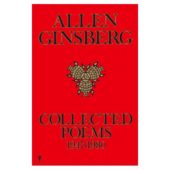 Michael Horovitz: Collected Poems by Allen Ginsberg The book which has probably most shaped my own literary and supra-literary awareness of the past 25 years is Collected Poems by Allen Ginsberg (Viking, 1984). This 860-page compendium of just about every poem the American-Jewish-Buddhist bard wanted to keep from his beginnings in 1947 will surely prove enlightening for anyone interested in contemporary writing. His two classic longer poems, ‘Howl’ and ‘Kaddish’, along with the rest of this vast body of richly diverse experiments, have done more than anything else I know of to open up the forms, content, musicality and candour of contemporary English-speaking poetry.
Michael Horovitz: Collected Poems by Allen Ginsberg The book which has probably most shaped my own literary and supra-literary awareness of the past 25 years is Collected Poems by Allen Ginsberg (Viking, 1984). This 860-page compendium of just about every poem the American-Jewish-Buddhist bard wanted to keep from his beginnings in 1947 will surely prove enlightening for anyone interested in contemporary writing. His two classic longer poems, ‘Howl’ and ‘Kaddish’, along with the rest of this vast body of richly diverse experiments, have done more than anything else I know of to open up the forms, content, musicality and candour of contemporary English-speaking poetry. 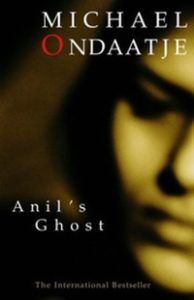 Minoli Salgado: Anil’s Ghost by Michael Ondaatje Anil’s Ghost is that rare and vital find – a quiet and utterly human book on the violent effects of war. There are no easy judgements or bold political gestures here – Ondaatje’s focus remains disarmingly direct, attentive to the most tenuous connections between people and events. In the process the occluded emotional landscape of war is revealed – fear, mistrust, the loss of faith and bearings – as well as the necessity for finding a language to translate the dislocations of experience. This novel is about Sri Lanka but also about so much more than Sri Lanka – a country that for over 25 years has endured a war as brutal as it is hidden. It is a novel that reminds us that perhaps the only way to end political violence is by stepping outside the language that accommodates it.
Minoli Salgado: Anil’s Ghost by Michael Ondaatje Anil’s Ghost is that rare and vital find – a quiet and utterly human book on the violent effects of war. There are no easy judgements or bold political gestures here – Ondaatje’s focus remains disarmingly direct, attentive to the most tenuous connections between people and events. In the process the occluded emotional landscape of war is revealed – fear, mistrust, the loss of faith and bearings – as well as the necessity for finding a language to translate the dislocations of experience. This novel is about Sri Lanka but also about so much more than Sri Lanka – a country that for over 25 years has endured a war as brutal as it is hidden. It is a novel that reminds us that perhaps the only way to end political violence is by stepping outside the language that accommodates it. 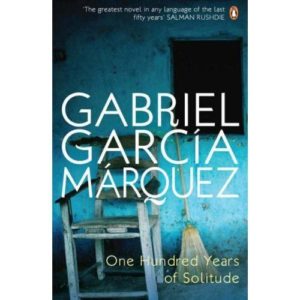 Nii Parkes: One Hundred Years of Solitude by Gabriel García Márquez I think One Hundred Years of Solitude taught the West how to read a reality alternative to their own, which in turn opened the gates for other non-Western writers like myself and other writers from Africa and Asia. Apart from the fact that it’s an amazing book, it taught Western readers tolerance for other perspectives.
Nii Parkes: One Hundred Years of Solitude by Gabriel García Márquez I think One Hundred Years of Solitude taught the West how to read a reality alternative to their own, which in turn opened the gates for other non-Western writers like myself and other writers from Africa and Asia. Apart from the fact that it’s an amazing book, it taught Western readers tolerance for other perspectives. 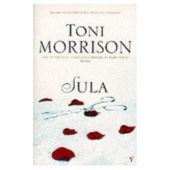 Roger Robinson: Sula by Toni Morrison I was late to Toni Morrison and picked up Sula after fellow poet Peter Kahn said it was his favourite book and he couldn't believe that I hadn't read it. When I got home to my surprise it was already in my library. It was my wife's copy and she read it when she was a student. It is the only book I ever read in one day from beginning to end. It's the first novel that I saw my aunts, mums and sisters in. Not in a metaphorical sense but I actually saw them. Sula was my Aunty Lynette extracting choice from choicelessness. Nel was my Aunty Monica, a good woman. It is a novel full of death but not in a morbid way but death punctuating the celebration of life and living. There's birth death sex and food. Everything I ever wanted to find in a novel.
Roger Robinson: Sula by Toni Morrison I was late to Toni Morrison and picked up Sula after fellow poet Peter Kahn said it was his favourite book and he couldn't believe that I hadn't read it. When I got home to my surprise it was already in my library. It was my wife's copy and she read it when she was a student. It is the only book I ever read in one day from beginning to end. It's the first novel that I saw my aunts, mums and sisters in. Not in a metaphorical sense but I actually saw them. Sula was my Aunty Lynette extracting choice from choicelessness. Nel was my Aunty Monica, a good woman. It is a novel full of death but not in a morbid way but death punctuating the celebration of life and living. There's birth death sex and food. Everything I ever wanted to find in a novel. 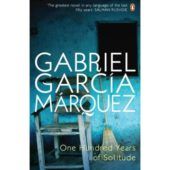 Sujata Bhatt: One Hundred Years of Solitude by Gabriel García Márquez I don't think any book has shaped world literature to the extent that the internet has in the past 25 years. I believe that the last book that has had a significant impact on world literature was One Hundred Years of Solitude by Gabriel García Márquez.
Sujata Bhatt: One Hundred Years of Solitude by Gabriel García Márquez I don't think any book has shaped world literature to the extent that the internet has in the past 25 years. I believe that the last book that has had a significant impact on world literature was One Hundred Years of Solitude by Gabriel García Márquez. 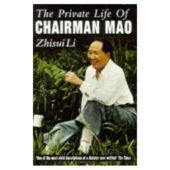 Sukhdev Sandhu: The Private Life of Chairman Mao by Dr Li Zhisui Dr Li Zhisui, The Private Life of Chairman Mao (1994). The last 25 years have not borne witness, as Francis Fukuyama predicted it would, to the end of history, but rather to its beginning. What has been unfolding in China has been a breathtakingly accelerated version of the Industrial Revolution, a Great Leap Forward altogether more momentous than anything effected by Mao Zedong. It was his death though that triggered these transformations. And it’s the death of his mystique that is announced on every page of this magnificent, agonized biography by his personal physician who offers insights, unparalleled in their intimacy, about the Great Helmsman’s whoring, hypochondria, megalomania. A map of a corrupted body, to say nothing of a corrupted body politic, it remains, even in an era overflowing with genocidal tyrants and dictators, a remarkable book, one whose reverberations will continue to be felt for the next 25 years too.
Sukhdev Sandhu: The Private Life of Chairman Mao by Dr Li Zhisui Dr Li Zhisui, The Private Life of Chairman Mao (1994). The last 25 years have not borne witness, as Francis Fukuyama predicted it would, to the end of history, but rather to its beginning. What has been unfolding in China has been a breathtakingly accelerated version of the Industrial Revolution, a Great Leap Forward altogether more momentous than anything effected by Mao Zedong. It was his death though that triggered these transformations. And it’s the death of his mystique that is announced on every page of this magnificent, agonized biography by his personal physician who offers insights, unparalleled in their intimacy, about the Great Helmsman’s whoring, hypochondria, megalomania. A map of a corrupted body, to say nothing of a corrupted body politic, it remains, even in an era overflowing with genocidal tyrants and dictators, a remarkable book, one whose reverberations will continue to be felt for the next 25 years too. 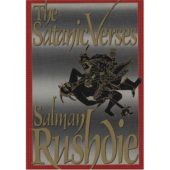 Tabish Khair: The Satanic Verses by Salman Rushdie In choosing The Satanic Verses as one of the important books of the last 25 years, I am consciously leaving out books – in the three other languages (Hindi, Urdu and Danish) I have some knowledge of – that could have competed for the honour. But to name them appears to be little else than self-indulgence, for they would not be familiar to most readers of (even) Wasafiri regardless of how many other readers might swear by them. Hence, it has to be Rushdie’s The Satanic Verses (1988): a baggy monster of a novel, brilliant in some parts, self-absorbed and gimmicky in others, a book of “metamorphosis, hauntings, memories, hallucinations, revelations, advertising jingles and jokes’, as The Times put it. It is a novel that could only have been written by someone from a Muslim background. It is also a novel that could only have been written by someone immersed in Western ways of seeing Islam. One can love it or hate it – personally I feel a position in between is the clearest indicator of sanity in today’s world – but one cannot ignore it.
Tabish Khair: The Satanic Verses by Salman Rushdie In choosing The Satanic Verses as one of the important books of the last 25 years, I am consciously leaving out books – in the three other languages (Hindi, Urdu and Danish) I have some knowledge of – that could have competed for the honour. But to name them appears to be little else than self-indulgence, for they would not be familiar to most readers of (even) Wasafiri regardless of how many other readers might swear by them. Hence, it has to be Rushdie’s The Satanic Verses (1988): a baggy monster of a novel, brilliant in some parts, self-absorbed and gimmicky in others, a book of “metamorphosis, hauntings, memories, hallucinations, revelations, advertising jingles and jokes’, as The Times put it. It is a novel that could only have been written by someone from a Muslim background. It is also a novel that could only have been written by someone immersed in Western ways of seeing Islam. One can love it or hate it – personally I feel a position in between is the clearest indicator of sanity in today’s world – but one cannot ignore it.
